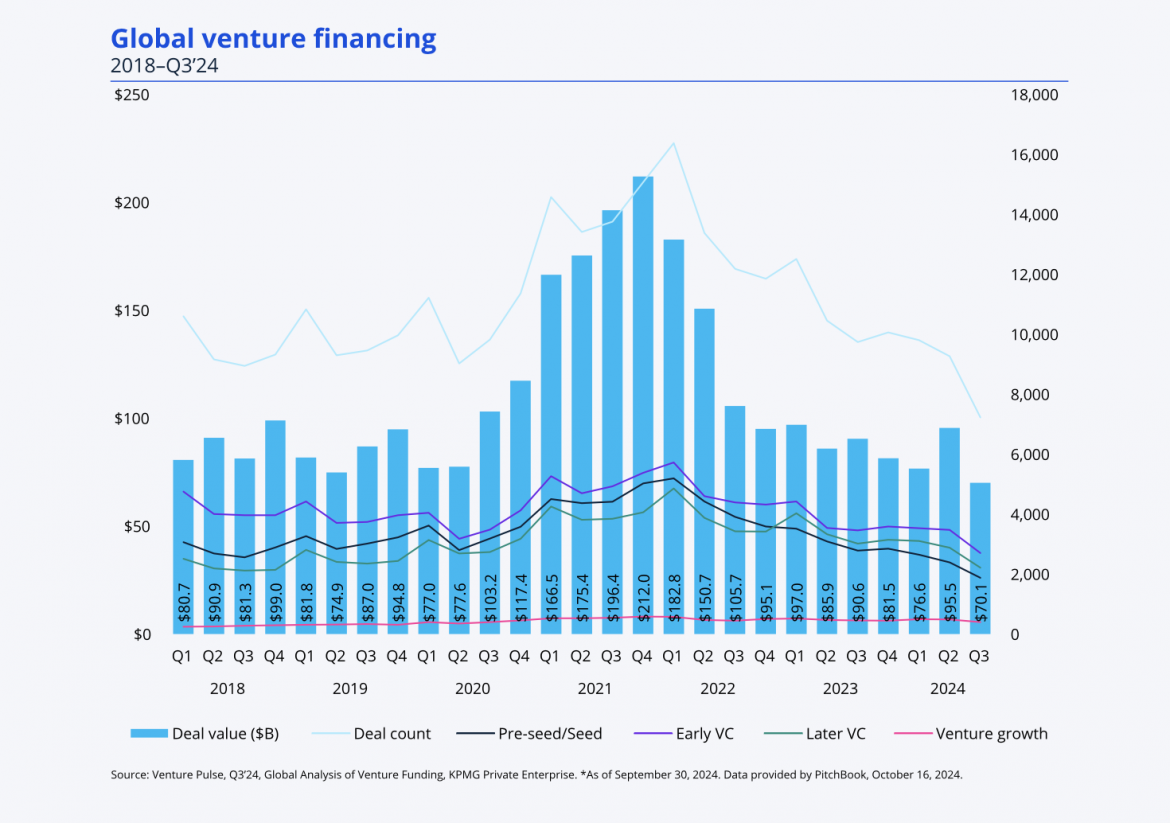- Global venture capital investment dropped sharply, while MENA markets saw increased investment growth.
- The decline is reshaping investment flows toward resilient, high-growth regions like MENA.
- Investors are pivoting to MENA’s tech-driven markets, supported by favorable government policies and economic stability.
Global Venture Capital Decline Reaches New Lows
The global venture capital (VC) market is experiencing its most significant decline in nearly seven years. According to KPMG’s Q3 2024 Venture Pulse report, VC funding levels are dropping, with fewer billion-dollar deals, particularly in the United States.
This slowdown in high-value deals is attributed to rising inflation, increased interest rates, and market volatility. Investors are becoming increasingly cautious, looking for stability and reevaluating where and how they allocate funds.
KPMG analysts have described this trend as a “period of reset,” where investors seek stable growth and long-term returns.
JPMorgan also highlights this shift in the Q3 Trends in Venture Capital report. It noted that traditional VC markets, once heavily focused on high-growth Western sectors, are seeing reduced activity as investment decisions become more risk-averse.
The data reveals a 30% year-over-year drop in global VC funding volumes. The drop reflects a comprehensive strategy shift among VCs.
Despite this downturn, emerging markets with stable economic growth and strong governmental support are attracting attention.
Investors are now exploring opportunities outside traditional high-stakes markets. Thus, VC is being drawn to regions with favorable conditions and growth potential.
MENA Market Gains Traction Amid Global Decline
In contrast to the global downturn, the Middle East and North Africa (MENA) region is seeing a sharp rise in VC activity. According to Magnitt’s Q3 2024 UAE Venture Investment report, the MENA region has attracted over USD 2B in venture capital this year.
This growth is largely driven by sectors like fintech, digital health, and e-commerce, which align with regional and global digital transformation trends.
Forbes Middle East emphasizes that “the UAE and Saudi Arabia rank among the top destinations for venture capital within MENA.” That, because of supportive government initiatives and technological advancements.
Government-backed initiatives in MENA countries have played a pivotal role in creating a supportive ecosystem for venture-backed startups. For instance, the UAE’s National Innovation Strategy has set a target to double the tech sector’s output by 2025.
By investing in smart cities, digital health, and financial technology, MENA countries are laying the groundwork for long-term growth. According to JPMorgan, “MENA markets offer agility and innovation, aligning well with investor priorities in global tech demands.”
Moreover, MENA’s youthful population and high digital adoption rates are essential to the region’s growth in venture funding.
The UAE, for example, has rapidly adopted digital banking and other fintech solutions. In turn, the UAE is attracting investments from international firms seeking to tap into this robust, tech-driven market.
Strategic Shift Toward Diversified Portfolios
The contrast between global and MENA VC markets highlights a strategic pivot in investor focus. With challenges in the West, investors are moving to diversify their portfolios. That means allocating capital to regions with high-growth potential and resilient economies.
This trend is seen as a practical response to the macroeconomic uncertainties plaguing established markets. MENA, with its supportive policy framework and digital-first economy, is increasingly attractive to investors.
JPMorgan’s insights into the evolving venture landscape emphasize that MENA’s tech-oriented sectors present a “unique growth environment,” where startups benefit from a blend of government support and a tech-savvy population.
Consequently, VC firms with a global reach are intensifying their focus on MENA to harness this regional momentum.
The growing confidence in MENA is further bolstered by its alignment with global trends in digitalization and innovation. According to KPMG’s analysis, the investment landscape in MENA contrasts starkly with a more cautious outlook for Western markets.
While MENA investments continue to climb, traditional markets face challenges, signaling a possible shift in the global venture landscape. Thus, the MENA faces the opportunity of turning a short-term trend into long-term innovation and development.
MENA Aligns with Global Digitalization Trends
The contrasting trends between global and MENA VC markets illustrate a broader shift driven by market demands for stability and innovation. The MENA startup ecosystem, with its robust government support and push for digital transformation, presents a compelling case for venture capital firms seeking alternatives.
As traditional VC markets face heightened economic pressures, MENA’s resilient sectors, supportive policies, and tech-first focus align closely with global trends. This suggests the region will play an increasingly significant role in the global venture ecosystem.
For investors, MENA’s position offers a balanced mix of growth and resilience that takes into consideration current market demands. Given the region’s current growth trajectory, MENA is likely to become an essential player in the global venture capital landscape.
It remains to be seen whether this is a seasonal phenomenon, or the MENA startup ecosystem will help in reshaping where and how capital is deployed in the years to come.
If you see something out of place or would like to contribute to this story, check out our Ethics and Policy section.
